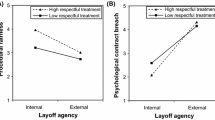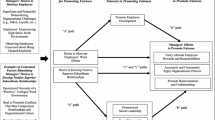Abstract
This study investigates the relationship between workers' perceptions of distributive and procedural justice afforded by a grievance system and their more general belief in an underlying moral order in the workplace. Using samples representing five ocupationally distinct groups, the presence of any moderating effects of occupation received only weak support. Consistent with previous work, however, workers' perceptions of procedural justice (i.e., fairness in the process) were a stronger predictor of workers' belief in workplace justice than were perceptions of distributive justice (i.e., fairness of outcomes).
Similar content being viewed by others
References
Adams, J. S.: 1963, ‘Toward an Understanding of Inequity’,Journal of Abnormal and Social Psychology 67, pp. 422–436.
Ansoff, H. I.: 1984,Implanting Strategic Management (Prentice-Hall, Englewood Cliffs, NJ).
Folger, R. and Greenberg, J.: 1985, ‘Procedural Justice: An Interpretive Analysis of Personnel Systems’, in K. Rowland and G. Ferris (eds.),Research in Personnel and Human Resources Management, Vol. 3 (JAI Press, Greenwich, CT).
Folger, R. and Konovsky, M. A.: 1989, ‘Effects of Procedural and Distributive Justice on Reactions to Pay Raise Decisions’,Academy of Management Journal 32, pp. 115–130.
Fryxell, G. E.: 1990, ‘Managing the Culture of Innovation: A Synthesis of Multiple Dialects’, in M. Lawless and L. Gomez-Mejia,Managing the High Tech Firm, pp. 37–56.
Fryxell, G. E. and Gordon, M. E.: 1989, ‘Workplace Justice and Job Satisfaction as Predictors of Satisfaction with the Union and Management’,Academy of Management Journal 32(4), pp. 851–866.
Gordon, M. E. and Fryxell, G. E.: 1989, ‘Voluntariness of Association as a Moderator of the Importance of Procedural and Distributive Justice’,Journal of Applied Social Psychology 19, pp. 993–1009.
Gordon, M. E. and Fryxell, G. E. (in press), ‘The Role of Interpersonal Justice in Organizational Grievance System’, in R. Cropanzano (ed.),Justice in the Workplace: Approaching Fairness in Human Resource Management (Lawrence Erlbaum Associates, Hillsdale, N.J.).
Greenberg, J.: 1990, ‘Organizational Justice: Yesterday, Today, and Tomorrow’,Journal of Management 16(2), pp. 399–432.
Hanushek, E. A. and Jackson, J. E.: 1977,Statistical Methods for Social Scientists (Academic Press, N.Y.).
Hayes, R. H. and Abernathy, W. J.: 1980, ‘Managing Our Way to Economic Decline’,Harvard Business Review 58, pp. 67–77.
Hickson, D. J., Hinings, C. R., Lee, C. A., Schneck, R. E. and Pennings, J. M.: 1971, ‘A Strategic Contingencies Theory of Intraorganizational Power’,Administrative Science Quarterly 14, pp. 378–397.
Homans, G. C.: 1961,Social Behavior: Its Elementary Forms (Harcourt, Brace & World, New York).
Hosmer, L. T.: 1987,The Ethics of Management (Irwin, Homewood, Ill.).
Joreskog, K. G. and Sorbom, D.: 1985, LISREL:Analysis of Linear Structural Relationships by the Method of Maximum Likelihood, Versions V and VI (International Educational Testing Service, Chicago).
Kahn, H.: 1986, ‘The Confucian Ethic’, in C. Kerr and P. D. Staudohar (eds.),Industrial Relations in a New Age: Economic, Social, and Managerial Perspectives (Josey-Bass, San Francisco), pp. 25–31.
Keeley, M.: 1988, ‘Individual Rights and Organization Theory’,Employee Rights and Responsibilities Journal 1, pp. 25–38.
Koys, D. J.: 1988, ‘Human Resource Management and a Culture of Respect: Effects of Employees' Organizational Commitment’,Employee Rights and Responsibilities Journal 1, pp. 57–68.
Lawrence, P. R. and Lorsch, J. W.: 1967,Organization and Environment: Managing Differentiation and Integration (Irwin, Homewood, Ill.).
Lerner, M. J.: 1980,The Belief in a Just World: A Fundamental Delusion (Plenum, New York).
Leventhal, G. S.: 1976, ‘Fairness in Social Relationships’, in J. W. Thibaut, J. T. Spence, and R. C. Carson (eds.),Contemporary Topics in Social Psychology (General Learning Press, Morristown, N.J.), pp. 211–239.
Lodge, G. C. and Vogel, E. Z.: 1987,Ideology and National Competitiveness: An Analysis of Nine Countries (Harvard Business School Press, Boston).
Montgomery, B. R.: 1989, ‘The Influence of Attitudes and Normative Pressures on Voting Decision in a Union Certification Election’,Industrial and Labor Relations Review 42, pp. 262–279.
Osigweh, C. A.: 1988, ‘The Challenge of Responsibilities: Confronting the Revolution in Workplace Rights in Modern Organizations’,Employee Rights and Responsibilities Journal 1, pp. 5–23.
Ouchi, W. G.: 1979, ‘A Conceptual Framework for the Design of Organizational Control Mechanisms’,Management Science 25, pp. 833–848.
Paulus, D.: 1983, ‘Sphere-specific measures of perceived control’,Journal of Personality and Social Psychology 44, pp. 1253–1256.
Perrow, C.: 1970,Organizational Analysis: A Sociological View (Wadsworth, Belmont, CA).
Rawls, J.: 1971,A Theory of Justice (Harvard University Press, Cambridge).
Rubin, Z. and Peplau, A.: 1973, ‘Belief in a Just World and Reactions to Another's Lot: A Study of Participants in the National Lottery’,Journal of Social Issues 29(4), pp. 73–93.
Sharma, S., Durand, R. M. and Gur-Arie, O.: 1981, ‘Identification and Analysis of Moderator Variables’,Journal of Marketing Research 18, pp. 291–300.
Simmons, C. H.: 1981, ‘Theoretical Issues in the Development of Social Justice’, in M. J. Lerner and S. C. Lerner (eds.),The Justice Motive in Social Behavior (Plenum Press, New York), pp. 41–73.
Steinbeck, J.: 1972,The Grapes of Wrath (Viking Press, New York).
Tawney, R. H.: 1952,Equality (4th ed.) (Allen & Unwin, London).
Thibaut, J. W. and Walker, L.: 1978,Procedural Justice: A Psychological Analysis (Lawrence Erlbaum Associates, Hillsdale, N.J.).
Thompson, J. D.: 1967,Organizations in Action (McGraw-Hill, New York).
Wilkens, A. and Ouchi, W. G.: 1983, ‘Efficient Cultures: Exploring the Relationship between Culture and Organizational Control’,Administrative Science Quarterly 28, pp. 468–481.
Williamson, O. E.: 1975,Markets and Hierarchies: Analysis and Antitrust Implications (Free Press, New York).
Williamson, O. E.: 1985,The Economic Institutions of Capitalism (Free Press, New York).
Author information
Authors and Affiliations
Additional information
Gerald E. Frxyell is an Assistant Professor in the Department of Management at the University of Tennessee, Knoxville. He has conducted research and published in the areas of innovation, organizational culture, corporate social performance, and management training in developing contexts.
Rights and permissions
About this article
Cite this article
Fryxell, G.E. Perceptions of justice afforded by formal grievance systems as predictors of a belief in a just workplace. J Bus Ethics 11, 635–647 (1992). https://doi.org/10.1007/BF00872275
Issue Date:
DOI: https://doi.org/10.1007/BF00872275




